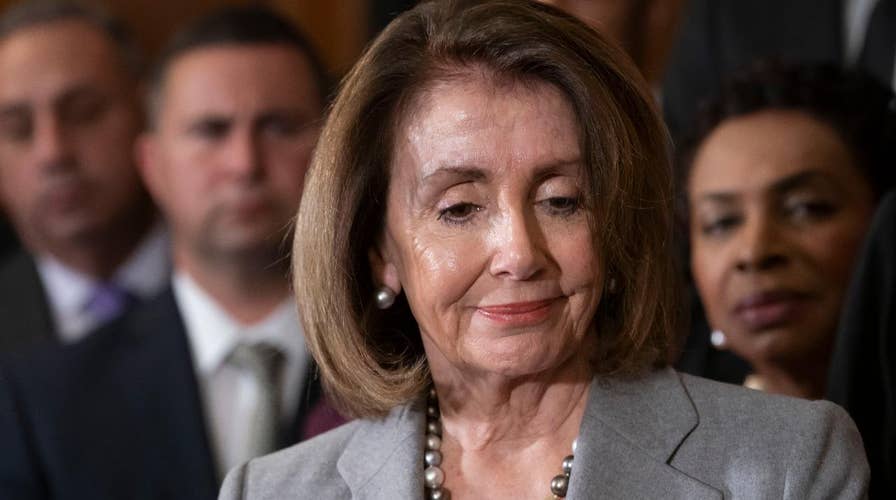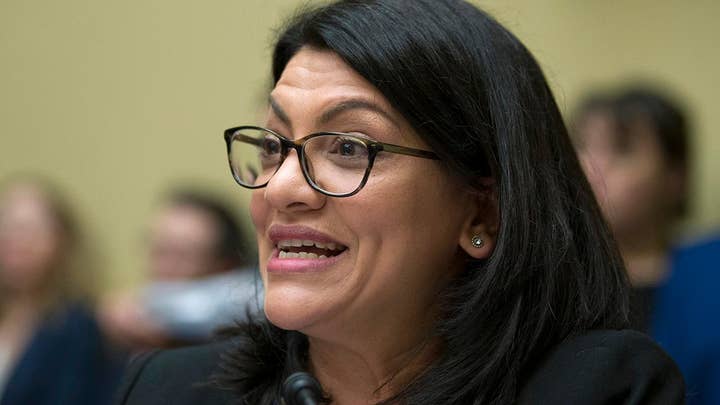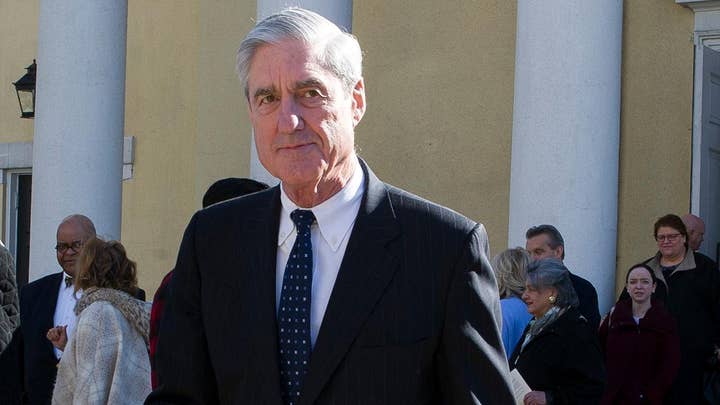Impeachment is on the table -- but it may just depend about whose table you’re talking about.
Does your family serve a traditional turkey at Thanksgiving? Or a deep-fried turducken? Cream gravy? Giblet gravy? Gravy with meat drippings? Green bean casserole on the side?
It all hinges on whose house in which you are dining.
Impeachment isn’t on the table in the home of House Speaker Nancy Pelosi, D-Calif. But impeachment is indeed the main entrée at the table of Reps. Rashida Tlaib, D-Mich., and Al Green, D-Texas. Despite the preliminary findings of Special Counsel Robert Mueller, Tlaib and Green are still pushing to impeach President Trump.
Green first introduced articles of impeachment two years ago. The freshman Tlaib snared headlines after she appeared at an event in Washington, D.C., just hours after she was sworn in as a new member on January 3.
“We’re going to go in and we’re going to impeach the motherf-----!” boasted Tlaib.
The Michigan congresswoman spoke in more measured terms last week as she touted a new effort to impeach Trump.
“The president hasn’t agreed to divest in foreign and domestic businesses. That puts him in direct conflict with the U.S. Constitution. He can’t do that as a sitting CEO, working out of the Oval Office,” said Tlaib. “We need to look at and investigate these possibly impeachable offenses.”
“This is our watch,” said Green. “Will we continue to allow the Constitution to be subverted?”
Green and Tlaib have been working to get the House Judiciary Committee to investigate whether or not President Trump committed offenses worthy of impeachment.
Green cited Alexander Hamilton writing about presidential impeachments in the Federalist Paper #65. In the Federalist Papers, Hamilton, James Madison and John Jay made the case for a check on the executive through what the British sometimes called “maladministration.” The Founders didn’t settle on “maladministration.” Instead, they concocted the term “high crimes and misdemeanors” as the threshold for impeachment.
At the Constitutional Convention, Madison said it was “indispensable” to include an impeachment clause in the nation’s founding document. A failure to do so would grant the executive too much power -- unless, of course, the people felt the executive abused his power and warranted removal the way they usually handled things in Europe: a raucous mob killing the king.
But, the Founders also wanted accountability. That’s why they granted the House the power of impeachment -- the equivalent of a Congressional indictment. Up for re-election every two years, House members are closest to the people and voters. Remember, in the beginning, state legislatures elected senators. So, the Founders wanted to impose political consequences on House members – if voters determined they pushed too hard for what was perceived as impeachment overreach.
“I want (my colleagues) only to do what Madison contemplated, Hamilton contemplated, Jay contemplated, in the Federalist Papers,” said Green. “This is our moment.”
And, if people believe Green and Tlaib have been going too far, they’ll have to face the voters in 2020, just as Madison, Hamilton and Jay envisioned.
“Leadership says to all of us, represent your district,” said Tlaib. “I can’t continue to look the other way when I have a president that does not follow the U.S. Constitution.”
TLAIB CALLS TRUMP 'MOST DANGEROUS THREAT' TO DEMOCRACY
The Democratic Congressional leadership usually gives its members great latitude on knowing best how to represent their districts. Impeaching President Trump appears popular in the districts represented by Green, Tlaib and a host of other Democrats -- but not all. The party won control of the House in large part because voters elected moderate Democrats in battleground districts where the president performed well. Is there distance between Pelosi, who took impeachment off the table a few weeks ago, and Democrats like Green and Tlaib?
“I don’t think that’s an important question,” said Pelosi. “Some people have been asking for impeachment for a while. That doesn’t impact my action.”
Pelosi added that the House “shouldn’t impeach a president because of a political reason.”
So what is the proper standard? The Constitution only says “high Crimes and Misdemeanors.”
Some Constitutional scholars have asserted the phrase “high Crimes and Misdemeanors” simply refers to a chief executive harming the state. That’s a little bit what Green is referencing.
But, doesn’t the result of the Mueller report findings, with no further indictments and no prosecution of the president, undercut an impeachment endeavor?
“Not one scintilla,” replied Green. “What we’ve been talking about has to do with the president’s behavior that is not criminal in nature. A president does not have to commit a crime to be impeached. Mr. Mueller is investigating criminality. The House taking up impeachment does not have to confine itself to that.”
Hence, the problem with what is defined as “high Crimes and Misdemeanors” as proscribed in Article II, Section 4 of the Constitution.
Many Constitutional scholars who have filleted the “high Crimes and Misdemeanors” touchstone have concluded that impeachment is not so much a legal question, but, indeed, a political question. One could certainly make an argument regarding the House’s decision to impeach both Presidents Andrew Johnson and Bill Clinton. The full House did not impeach President Richard Nixon – and perhaps the case for impeachment was stronger there than in the instances of Johnson and Clinton. That’s why Pelosi noted that “we shouldn’t not impeach a president if the evidence is there for impeachment. But that’s not where we are.”
Pelosi faced a cadre of lawmakers demanding impeachment for President George W. Bush over the Iraq war in 2006 just after Democrats won the House and she was about to become speaker. Pelosi remarked at the time that “impeachment was off the table.” Pelosi mirrored those remarks a few days ago when asked about President Trump and the Mueller report.
“Impeachment is not on the table until it is on the table,” said Pelosi.
Yet, impeachment is on the bill of fare served by Green, Tlaib and others. So, what in fact constitutes “the table?”
“I think the Speaker made it very clear that (impeachment is) not on the table,” said House Majority Leader Steny Hoyer, D-Md, “and I will tell you what the table is. It’s at least the Speaker and myself.”
CLICK HERE TO GET THE FOX NEWS APP
Pelosi and Hoyer are the ones who count – along with most Democrats who have no interest in impeaching President Trump. So, impeachment is not an entrée on most Democratic dinner tables. It is hardly the main course.
Depending on the district, impeachment is at best, an amuse-bouche.

















































